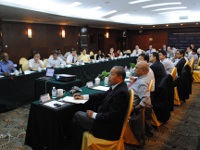Registration
You will receive an email confirming your registration.
IMGXYZ3181IMGZYXChina and India have vast energy demands and civil nuclear programs. In the wake of the Fukushima nuclear crisis in Japan, nuclear safety and security will play a major role in both countries’ nuclear evolution and cooperation in the years to come. In guiding these trends, China’s participation in the non-proliferation regime and India’s status outside the regime are central issues. In the second part of a two-day Carnegie-Tsinghua Center for Global Policy event, “China and India: Nuclear Doctrine and Dynamics,” over 40 military, academic, and scientific experts from China and India discussed the future of India and China’s nuclear energy programs and the non-proliferation regime. Carnegie’s Lora Saalman moderated.
Nuclear Energy
- Post-Fukushima: Two Indian scientists argued that investment in and support for nuclear energy is crippled by public fear of radiation and the disproportionate public reaction to the Fukushima incident. Historically, radiation has caused few direct deaths and no civilians died from radiation during the Fukushima crisis, argued one Indian expert. Nonetheless, a Chinese scientist noted that China’s State Council has recently undertaken measures to ensure greater safety at its nuclear plants by:
- Examining the safety of all nuclear facilities;
- Strengthening the safety management of all operational nuclear facilities;
- Comprehensively reviewing the nuclear facilities under construction;
- Suspending approval of new projects until new safety criteria and regulations are issued.
- Examining the safety of all nuclear facilities;
- Regional Coordination: One Chinese expert proposed building an Asian network of nuclear power plant collaboration. He argued such efforts would enhance the safety and security of nuclear energy, as well as provide greater transparency and demonstrate countries’ peaceful intentions. Threats to safety and security—such as pollution, proliferation, and natural disasters—can have regional effects and thus should be addressed in concert with neighboring countries, he concluded.
- Prospects for R&D: Despite a lackluster follow-up to discussion of bilateral nuclear cooperation in 2006, China and India should continue to aggressively pursue nuclear energy development, argued a Chinese expert. While advocating joint R&D, one Chinese delegate noted that all businesses must abide by Chinese laws and meet International Atomic Energy Agency (IAEA) safeguards obligations. An Indian analyst added that India hesitates to engage China on nuclear power plant development because of concerns China will share this technology with Pakistan.
Nuclear Regime
- Nuclear Suppliers Group: One Indian expert explained that, within the non-proliferation regime, the Nuclear Suppliers Group (NSG) has the most direct link to India’s program, as it was created in the aftermath of India’s 1974 nuclear test. He argued, however, that the NSG also played a central role in re-opening the door between India and the regime in 2008, when it issued India a waiver for nuclear commerce. He highlighted the view in Delhi that China has been opposing India’s regime integration through a variety of methods, including past efforts to thwart India’s waiver and current demands for a criteria-based approach at the NSG.
- Comprehensive Test Ban Treaty: One Chinese participant emphasized the responsibility of the United States in popularizing CTBT ratification. He argued ongoing U.S. concerns about the effectiveness and longevity of its nuclear deterrent have hindered this process. Yet, he noted that a decision by the United States to ratify the CTBT would favorably impact China’s decision as to ratification, as well as India and Pakistan’s debates about whether or not to sign onto and ultimately ratify the treaty.
- Fissile Material Cut-off Treaty: One Chinese expert explained that the Fissile Material Cut-off Treaty (FMCT) confronts two tough issues at the Conference on Disarmament (CD), namely verification and stockpiles. In early 2010, these issues were complicated by Pakistan’s argument that a treaty that does not address existing stocks will “freeze existing asymmetries” with rival India. This expert argued the U.S.-India civil nuclear cooperation agreement further exacerbated Pakistan’s concerns that India will be able to increase fissile material production for weapons. While China supports the FMCT, the expert noted that Beijing recognizes the following treaty issues:
- Scope of Prohibition – The scope should delimit “production purposes,” with a distinction drawn between production of fissile materials for military and civil use, argued a Chinese panelist. The future treaty should ban fissile material production for nuclear weapons only, not for other military uses or civil fissile material production.
- Range of Inclusion – A Chinese expert argued that the future treaty should include not only all nuclear-weapons states, but also de facto nuclear-weapons states. However, another Chinese analyst noted that nuclear-weapons states, de facto nuclear-weapons states, and non-nuclear-weapons states should not have the same set of responsibilities under the treaty.
- Verification Measures – Verification should: strictly follow the scope of prohibition of the treaty; be reasonable and effective; provide equal rights and responsibilities for signatories; limit intrusiveness as much as possible, while preventing abuse; not hinder peaceful scientific research and production; and emphasize low cost and high effectiveness.
- Scope of Prohibition – The scope should delimit “production purposes,” with a distinction drawn between production of fissile materials for military and civil use, argued a Chinese panelist. The future treaty should ban fissile material production for nuclear weapons only, not for other military uses or civil fissile material production.
- Bilateral Cooperation: Indian and Chinese participants advocated the release of a joint statement or agreement on No First Use (NFU). This, combined with confidence-building measures in the border areas, and statements of non-attack—covering nuclear and conventional weapons—against nuclear facilities, would improve bilateral ties, suggested one Indian expert. A Chinese panelist said bilateral military dialogues, followed by high-level political talks, are crucial for bilateral cooperation. He stressed that China is moving towards a greater understanding of India’s views on Pakistan, but India must also be aware of how its relationship with the United States affects Sino-Indian ties.
Discussants: Avinash Godbole, Dipak Sundaram, Su Hao, Wang Haibin, Liu Siwei, Wang Jun, Prathibha Nair, Manjunath Tagadi, Ma Jiali, Mao Jikang, Long Xingchun, Rukmani Gupta, Gunjan Singh
